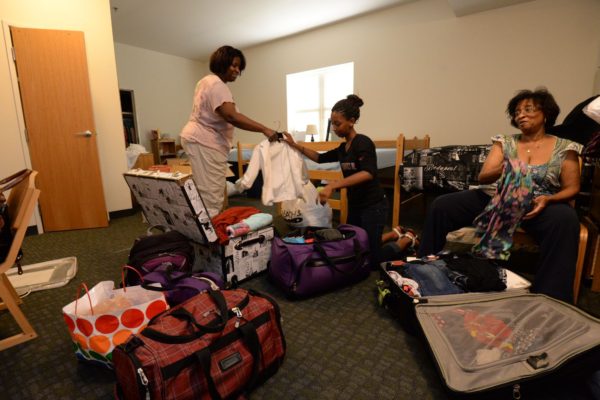Timeless advice for parents of new college students
Now in its sixth edition, Karen Levin Coburn’s “Letting Go: A Parents’ Guide to Understanding the College Years” gives parents an insider’s look at campus life and helps them navigate the complex emotions both they and their child will experience during the transition to college.
Nurturing may protect kids from brain changes linked to poverty
Researchers at the School of Medicine have identified changes in the brains of children growing up in poverty. Those changes can lead to lifelong problems like depression, learning difficulties and limitations in the ability to cope with stress. But the study showed that the extent of those changes was influenced strongly by whether parents were attentive and nurturing. Pictured is principal investigator Joan L. Luby, MD.
Increasing fathers’ engagement in parenting programs
In an effort to increase father participation in parenting programs, as well as
improve father-child interactions, Patricia L.
Kohl, PhD, associate professor of Social Work at the Brown School at
Washington University in St. Louis, has collaborated with the
Father’s Support Center of St. Louis to develop Engaging Fathers in
Positive Parenting, a program funded by the CDC designed to be used in
conjunction with the evidence-based parenting intervention, Triple P,
Positive Parenting Program.
New Year’s resolutions: 13 for ’13
As the holidays draw near, expect the usual onslaught of well-intentioned suggestions for lifestyle changes guaranteed to
make you healthier, wealthier and wiser in the new year. Talk is cheap, but these 13 New Year’s resolutions for 2013 are backed up by decades of research. If your resolve needs strengthening, click through the embedded web links to learn more
about the research behind the resolutions, including tips on using your
smart phone to quit smoking and the best way to pay down your holiday
debt.
Folic acid may reduce some childhood cancers
Folic acid fortification of foods may reduce the incidence of the most common type of kidney cancer and a type of brain tumors in children, finds a new study by Kimberly J. Johnson, PhD, assistant professor at the Brown School at Washington University in St. Louis, and Amy Linabery, PhD, postdoctoral fellow at the University of Minnesota. Incidence reductions were found for Wilms’ tumor, a type of kidney cancer, and primitive neuroectodermal tumors (PNET), a type of brain cancer.
Mom’s love good for child’s brain
School-age children whose mothers nurtured them early in life have brains with a larger hippocampus, a key structure important to learning, memory and response to stress. The new research, by child psychiatrists and neuroscientists at Washington University School of Medicine in St. Louis, is the first to show that changes in this key region of children’s brain anatomy are linked to a mother’s nurturing.
Teens with autism face major obstacles to social life outside of school, study finds
Hanging out with friends after school and on the weekends is a vital part of a teen’s social life. But for adolescents with autism spectrum disorders, social activity outside of school is a rarity, finds a new study by Paul Shattuck, PhD, autism expert and assistant professor at the Brown School at Washington University in St. Louis.
New book on Latina teen suicide attempts uncovers reality behind grim statistics
Luis Zayas’ commitment to U.S. Latinas and their struggle with suicide started in the 1970s when he encountered the pain and suffering that the teenage girls and their parents were experiencing during his work in emergency rooms and mental health-care clinics. “Latinas have the highest rate of suicide attempt among teens in comparison to white girls or African-American girls,” says Zayas, PhD, the Shanti K. Khinduka Distinguished Professor of Social Work at the Brown School at Washington University in St. Louis. Zayas brings compelling personal stories and nearly 40 years of research to his new book, Latinas Attempting Suicide: When Cultures, Families and Daughters Collide, published by Oxford University Press.
Cell phones on college campuses make ‘letting go’ a challenge
Photo by David Kilper / WUSTL PhotoMore than half of college students now own a cell phone, according to the authors of *Letting Go*.The author of a book offering advice to parents sending a child off to college says that the ubiquitous cell phone makes it easier for parents and students to keep in touch, but it also offers a challenge to the “letting-go” process. Karen Levin Coburn, assistant vice chancellor for students and associate dean for the freshman transition at Washington University in St. Louis, is co-author of Letting Go: A Parents’ Guide to Understanding the College Years, which provides a comprehensive, down-to-earth guide for parents experiencing the varying emotions of parenting a college student. The book, now in its newly released fourth edition, has sold more than 300,000 copies since first being released in 1988. “When we wrote our 1997 edition, very few people used cell phones. They just weren’t an issue,” Coburn says. “Now the majority of students have a cell phone and they’ve made a huge difference, pro and con, in the communication patterns between parents and students.”

